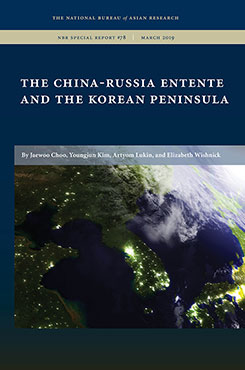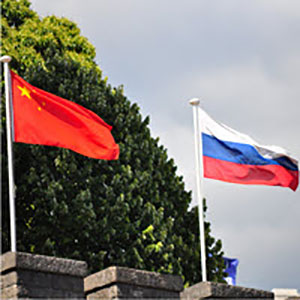Foreword: The China-Russia Entente and the Korean Peninsula
This is the foreword to the report “The China-Russia Entente and the North Korean Peninsula.”
By the end of 2017, tensions on the Korean Peninsula had reached an unprecedented level of instability as a direct result of North Korea’s advancements in its nuclear weapons and ballistic missile programs, especially the record number of ballistic missile tests in 2017. Yet despite the rapid improvement in relations between the United States and North Korea since then, a nuclear deal still seems a distant possibility as the two sides have failed to come to terms with each other’s vastly differing definitions of denuclearization. Less often mentioned, however, is the impact of two powers sitting behind the curtains, namely China and Russia.
This NBR Special Report seeks to assess the role of these two powers, separately and in coordination, in the interplay of strategic political, security, and economic issues on the Korean Peninsula. Driven by common dissatisfaction with real or perceived Western constraints on their geopolitical ambitions, China and Russia have steadily converged in their positions on key regional strategic issues. Though the two maintain independent interests on the margins, their core aims on the Korean Peninsula appear congruent and largely complicate the United States’ pursuit of its goals. In fact, Russia’s support for, and the growing popularity of, China’s dual-track approach to the North Korean nuclear dilemma—the establishment of a peace mechanism (and likely the withdrawal of U.S. troops) with the denuclearization of the Korean Peninsula—presents deep challenges to the United States in part through what appears to be an underlying aim of dismantling the U.S. alliance with the Republic of Korea (ROK) and in turn neutralizing U.S. influence on the peninsula.
Indeed as one author in this report expresses, alignment between China and Russia over North Korea may foreshadow a longer, more contracted process of coordination between the two partners in opposition to U.S. interests in the region. This dovetails closely with the findings of the National Bureau of Asian Research (NBR) project entitled “The Strategic Implications of China-Russia Relations,” which identified a clear trend in China’s and Russia’s coordinated pursuit of geostrategic goals largely at odds with U.S. interests on the international stage. [1]
Thanks to the generous support of the Korea Foundation, NBR has invited four leading experts to assess the impact of China-Russia relations on several intractable issues confronting the Korean Peninsula—in particular, North Korean nuclear weapons and ballistic missile development—as well as to provide regional perspectives on the implications for major stakeholders, including the United States. The essays benefited from discussions at a workshop that NBR organized on the same topic in May 2018 in Seoul, which convened policymakers and scholars from the ROK, the United States, China, Russia, and Japan.
In the first essay, Elizabeth Wishnick makes the case that China and Russia have aligned over the denuclearization of North Korea because of parallel, albeit not identical, interests on the Korean Peninsula. A noticeable difference lies, for example, in the extent to which each country is willing to pressure South Korea over opposition to Terminal High Altitude Area Defense (THAAD). The congruent but not identical nature of these interests allows each country greater flexibility within the partnership. While both China and Russia support the same means of denuclearization, such as a “double freeze,” Wishnick argues that they have different motivations. China has clear security-driven interests, while Russia seeks economic opportunities and great-power prestige. The flexibility of the Sino-Russian relationship presents a distinct obstacle to U.S. policy in the region.
Youngjun Kim focuses on North Korean strategy and cites the country’s juche (self-reliance) ideology to make the argument that North Korea will not completely pivot toward any one power, whether China, Russia, or the United States, and instead will likely try to balance between the three. Seeking to reduce its reliance on China, North Korea has looked to Russia as an alternative source of economic and military support. At the same time, a series of de-escalation efforts have allowed it to gradually begin engaging with the United States and South Korea. A balanced power strategy, Kim argues, could lead North Korea down a path similar to the one Vietnam followed to economic prosperity. Moreover, North Korea’s shift from being an adversary to a friend of the United States would increase the United States’ position and influence on the peninsula.
Harking back to the 1950s, when China, Russia, and North Korea were allied as Communist states against the United States, Artyom Lukin suggests that the three powers have again become aligned in recent times to take on U.S. dominance and influence. This time, however, hard geopolitical interests, rather than ideology, have been the driving factors. Lukin contends that Russia is willing to not oppose Chinese expansionism in the Asian theater and to let China lead on the Korean Peninsula in exchange for Chinese support of Russian interests in Europe and the Middle East. This alignment will challenge the United States’ interests in multiple regions, effectively diverting U.S. resources from a single front. An overstretched United States may decide to seek a partner in Russia to balance competing Chinese ambitions in Asia. Such a partnership, however, would require the United States to make major concessions to Russia.
The final essay by Jaewoo Choo examines the changing regional dynamics on the Korean Peninsula and attributes growing Sino-Russian alignment to a geopolitical opportunity to push back against long-standing U.S. dominance. Although the United States has maintained strong influence—militarily and politically—in South Korea, the pressure to denuclearize North Korea has provided an opening for China and Russia to expand their combined sphere of influence. Sino-Russian cooperation has given birth to a dual-track approach in which the denuclearization of North Korea is directly dependent on the withdrawal of U.S. forces from South Korea, thereby compromising the U.S.-ROK alliance. Choo posits that elements of U.S. isolationism under the Trump administration have allowed China and Russia to play a larger role in setting the terms and conditions of a peace agreement between the two Koreas and contributed to reducing U.S. influence on the peninsula.
I would like to thank the Korea Foundation for making possible both this report and the workshop in Seoul. The workshop proceedings would also not have been possible without critical support from the Asan Institute for Policy Studies. Finally, I am deeply grateful to my NBR colleagues Brian O’Keefe, for his relentless support of this project, and Aimée Tat and Edward Collins-Chase, for their assistance in preparing the report for publication.
Brian Franchell is Senior Project Manager for Political and Security Affairs at the National Bureau of Asian Research
Endnotes
[1] For the findings of this project, see Richard J. Ellings and Robert Sutter, eds., Axis of Authoritarians: Implications of China-Russia Cooperation (Seattle: NBR, 2018); and Robert Sutter, “China-Russia Relations: Strategic Implications and U.S. Policy Options,” NBR, NBR Special Report, no. 73, September 2018.



